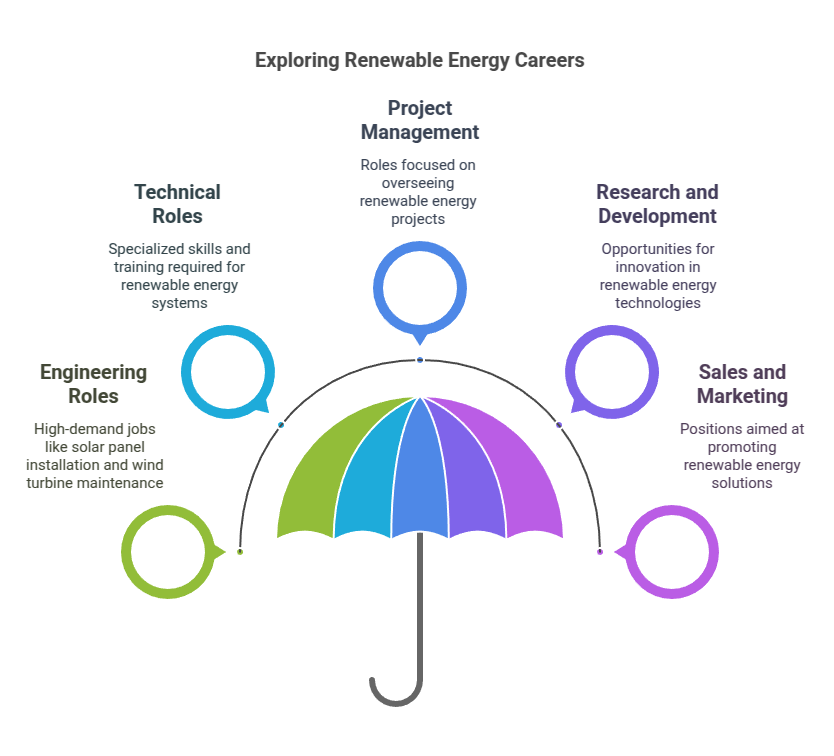The market of renewable energy India has grown dramatically in recent years, and 2024 will be a watershed moment. According to the most recent data, employment prospects in renewable energy have increased by 23.7%. This increase not only reflects the sector’s growth, but also highlights the global shift towards sustainable energy alternatives.
Here we will dig into the drivers driving this rise, the ramifications for the workforce, and the long-term prospects for renewable energy employment.
The Surge in Employment Opportunities
Several factors contribute to the 23.7% increase in employment possibilities in the renewable energy sector by 2024. To begin, there is a rising worldwide acknowledgment of the need to move away from fossil fuels and towards cleaner energy sources in order to tackle climate change. Governments throughout the world are setting high targets for renewable energy adoption, which is driving up investment in the sector.
For example, the United States has implemented new regulations to reduce carbon emissions, which involve significant expenditures in wind and solar energy projects. Similarly, the European Union’s Green Deal has paved the way for large investments in renewable energy infrastructure. These governmental actions are fostering a favourable climate for job growth in the sector.
Technological Advancements
Technological advancements have played a crucial role in making renewable energy more viable and cost-effective. Innovations in solar panel efficiency, wind turbine technology, and energy storage solutions have significantly reduced the cost of renewable energy production. As a result, more projects are being initiated, and existing ones are being scaled up, leading to increased demand for skilled workers.
For example, four states in India, mainly Rajasthan, Maharashtra, Gujarat, Karnataka, have more than half of the country’s renewable energy potential. According to the ministry’s Energy Statistics 2024, Rajasthan has the largest proportion of the estimated renewable power potential, accounting for around 20.3%.
Diverse Job Opportunities
The renewable energy sector offers a wide range of job opportunities, from engineering and technical roles to positions in project management, research and development, and sales and marketing. This diversity is attracting professionals from various fields, contributing to the overall increase in employment.
Engineering roles, such as solar panel installation and wind turbine maintenance, are in high demand. These jobs require specialised skills and training, leading to the creation of educational programs and certification courses to equip workers with the necessary expertise. In addition, there are opportunities in the development and deployment of smart grid technologies, which are essential for integrating renewable energy into existing power systems.

Decrease in Attrition Rates
Interestingly, the data also indicates that the attrition rate in the renewable energy sector has decreased to 33.5% in FY24, compared to 38.8% in the previous fiscal year. This decline suggests that employees in the renewable energy sector are finding more stability and satisfaction in their roles. Several factors contribute to this trend.
Firstly, the renewable energy sector is perceived as a forward-looking industry with a strong sense of purpose. Many professionals are drawn to the sector because they want to contribute to a sustainable future. This sense of mission can lead to higher job satisfaction and lower turnover rates.
Secondly, companies in the renewable energy sector are increasingly investing in employee development and well-being. They are offering competitive salaries, benefits, and opportunities for career advancement. These measures help retain talent and reduce attrition rates.
Economic and Social Impacts
The growth in renewable energy employment has significant economic and social impacts. Economically, the expansion of the renewable energy services contributes to GDP growth and stimulates local economies. Renewable energy projects often require substantial investment in infrastructure and services, creating a ripple effect that benefits various industries.
Socially, the rise in renewable energy jobs can lead to improved living standards and reduced poverty levels, particularly in regions where traditional industries are declining. For instance, communities that previously relied on coal mining are finding new opportunities in renewable energy projects. This transition is not only creating jobs but also promoting a healthier environment and better quality of life.
The Role of Education and Training
As the renewable energy India sector grows, there is a pressing need for a skilled workforce. Educational institutions and training centres are stepping up to meet this demand by offering specialised programs in renewable energy technologies. Universities are introducing degrees in renewable energy engineering, while technical schools are providing certification courses for solar panel installation, wind turbine maintenance, and energy auditing.
These educational initiatives are essential for ensuring that the workforce has the necessary skills to support the sector’s growth. They also provide a pathway for young people and career changers to enter the renewable energy field. Governments and industry bodies are supporting these efforts through grants, scholarships, and partnerships with educational institutions.
Future Prospects
The future of employment in renewable energy India looks promising. With ongoing technological advancements, supportive policies, and increasing public awareness of environmental issues, the sector is poised for continued growth. The International Renewable Energy Agency (IRENA) predicts that the renewable energy sector could employ over 40 million people worldwide by 2050, up from about 12 million today.
One of the key areas of future growth is likely to be solar energy. Solar power has the potential to generate significant amounts of energy, and countries with abundant sunlight are investing heavily in this technology. Another promising area is energy storage, which is critical for managing the intermittent nature of renewable energy sources like solar. Advancements in battery technology and other storage solutions will create new job opportunities in manufacturing, installation, and maintenance.
Moreover, the integration of renewable energy services with other sectors, such as transportation and construction, will drive further employment growth. For instance, the increasing adoption of electric vehicles (EVs) will require the expansion of EV charging infrastructure, creating jobs in installation and maintenance. Similarly, the construction of energy-efficient buildings and retrofitting of existing structures will generate employment in the green building sector.
Conclusion
The economic and social impacts of this growth are profound, contributing to GDP growth, stimulating local economies, and improving living standards. Companies like the Hartek Group stand out as a hub of innovation and expertise in the field of sustainable energy solutions. As the sector continues to expand, the role of education and training will be crucial in ensuring a skilled workforce to support its development. Looking ahead, we are on the biggest hiring drive where we are seeking young people to join our team and contribute to the historic energy shift and growth in the power generation sector. We firmly believe that young minds are full of energy, enthusiasm, and new ways of thinking, all of which are very important for any organisation.
Frequently Asked Questions
1. Why are employment opportunities increasing in the renewable energy sector?
The sector is growing due to government policies, technological advancements, and global efforts to shift from fossil fuels to sustainable energy solutions.
2. What types of jobs are available in renewable energy?
Opportunities range from engineering roles (solar panel installation, wind turbine maintenance) to project management, R&D, sales, and smart grid technologies.
3. How does renewable energy job growth impact the economy?
It boosts GDP, stimulates local economies, and provides alternative employment for communities transitioning from traditional industries like coal mining.
4. Why has the attrition rate in renewable energy jobs decreased?
Employees find stability, purpose, and career growth opportunities in the sector, leading to higher job satisfaction and lower turnover rates.
5. How can individuals prepare for careers in renewable energy?
Universities and training centers offer specialized programs in solar energy, wind power, and energy storage, supported by government and industry partnerships.
Share:
Explore More
Keep up-to-date with the most trending news stories that are shaping the world today.








